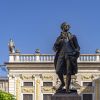“We will never be able to conclude our interpretation of Goethe”
In the interview, Charlotte Lee from the University of Cambridge explains, why the great poet is still relevant today and will always continue to be.

Dr Lee, Johann Wolfgang Goethe was born 275 years ago. Is this German writer still relevant today?
Yes, absolutely! Goethe had an astonishingly rich imagination, and there is hardly an area of human experience and human psychology that he did not think about. His work is full of stories about love, yearning, hope, loss, religious challenges and friction between social classes. His use of language is astonishing, too. It’s not simple, especially for a non-native speaker such as myself, but it is bursting with wonderful rhythm and imagery.
A writer does not necessarily have to anticipate our present-day problems to be relevant for us, but Goethe does. He was very much aware, for example, of how human beings are changing fragile natural ecosystems. He openly addressed the issue of sexuality in his work, frequently in a way that called the standards of the time into question. He was not opposed to progress, but very sceptical with regard to the restlessness and “acceleration” that were already becoming part of modern life: communication that he felt had spiralled out of control and a restless economy.

Goethe continues to be the by far most famous author in Germany. You are teaching in Cambridge: how relevant is Goethe internationally?
Goethe himself had a very international outlook. He only visited a handful of countries, but sought inspiration from many different cultures: His book West–East Divan, for example, is an homage to the Persian poet Hafez from the 14th century. The poems in his Chinese-German Book of Seasons and Hours were inspired by classic Chinese literature. Goethe is well-known in Iran nowadays and academics in China are working on the first translation of his complete works, which will consist of hundreds of volumes.
New research projects keep being initiated, also in the English-speaking world. One of my favourites is this dictionary that seeks to explain Goethe’s way on thinking based on individual words: https://goethe-lexicon.pitt.edu/GL. Our students here in Cambrige read Faust in their first year. It still amazes me to think that Goethe was only 25 years old – not much older than those students – when he wrote his first draft of Faust in 1774.

Generations of scholars have been dealing with Goethe’s works since his death back in 1832. Is there even anything left to do research on?
Yes, of course! Every reader will experience every line of a poem slightly differently, and Goethe’s work is so clever, it will always continue to renew itself. Speaking about his imagination again: he created so many scenarios in his works and was active in so many different fields – not only in literature but also in science and art – that we will never be able to conclude our interpretation of him. Every generation will have other concerns and ways of thinking and his work will always be able to live up to this challenge.
A more personal question: do you have a favourite quote by Goethe?
Can I give two? One of my favourite poems is called Vermächtnis, and there’s a beautiful line in this poem:
“Am Sein erhalte dich beglückt” – never cease to find delight in being.
There is also a moment in Hermann and Dorothea that I keep finding very touching. Dorothea, who has demonstrated great bravery during the war, faces the father of the man that she loves and that she believes she is losing:
“Say, is it noble, with so much of mockery straightway to greet me
That I am sent from the house while my foot is scarce yet on the threshold?”
Dr Charlotte Lee is the Director of the German Section of the University of Cambridge.


